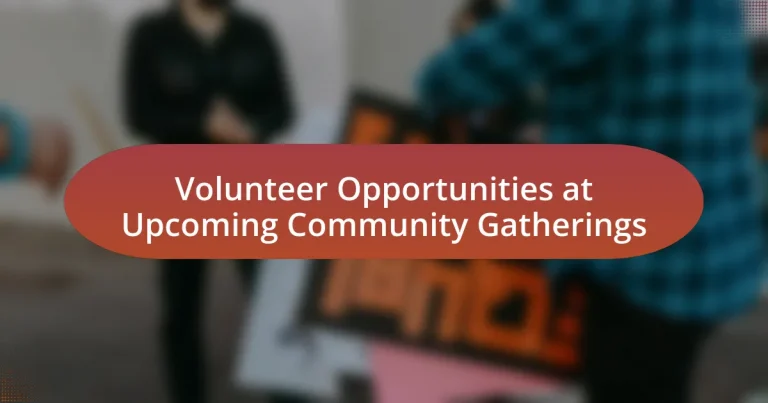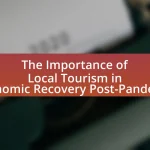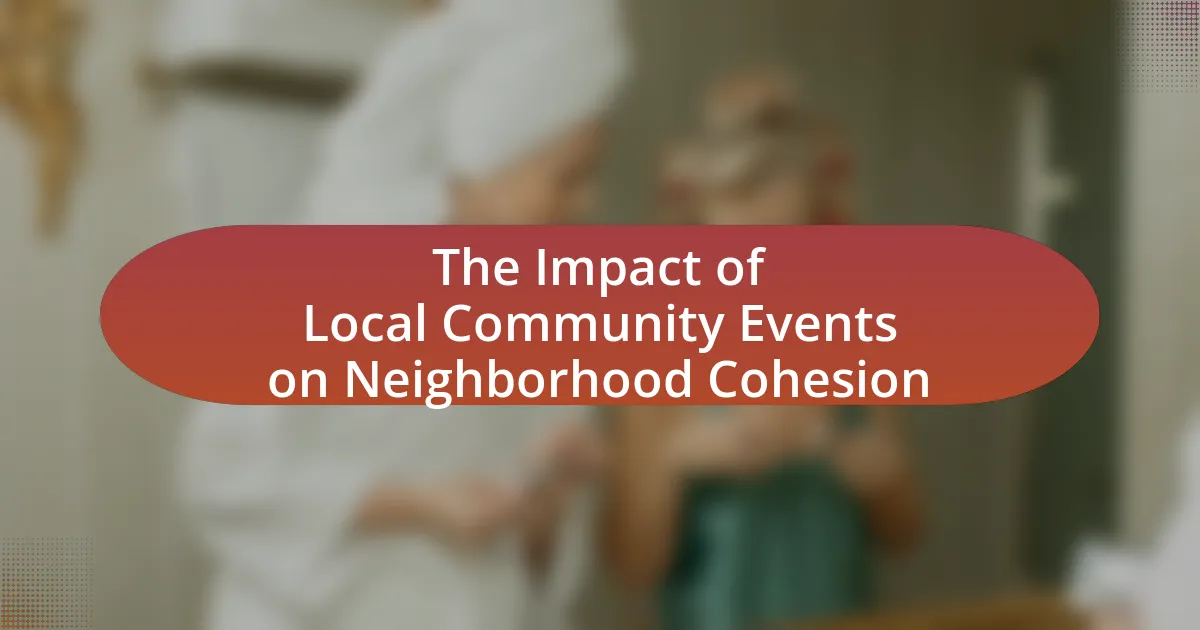Volunteer opportunities at upcoming community gatherings encompass various roles such as event setup, registration assistance, and activity coordination, which are essential for enhancing attendee experiences and supporting event logistics. Individuals can get involved by registering through local community centers or online platforms like VolunteerMatch. The article outlines the types of roles available, necessary skills, and the importance of volunteering for community cohesion and personal development. It also highlights specific upcoming events needing volunteers, resources for locating opportunities, and best practices for effective participation.
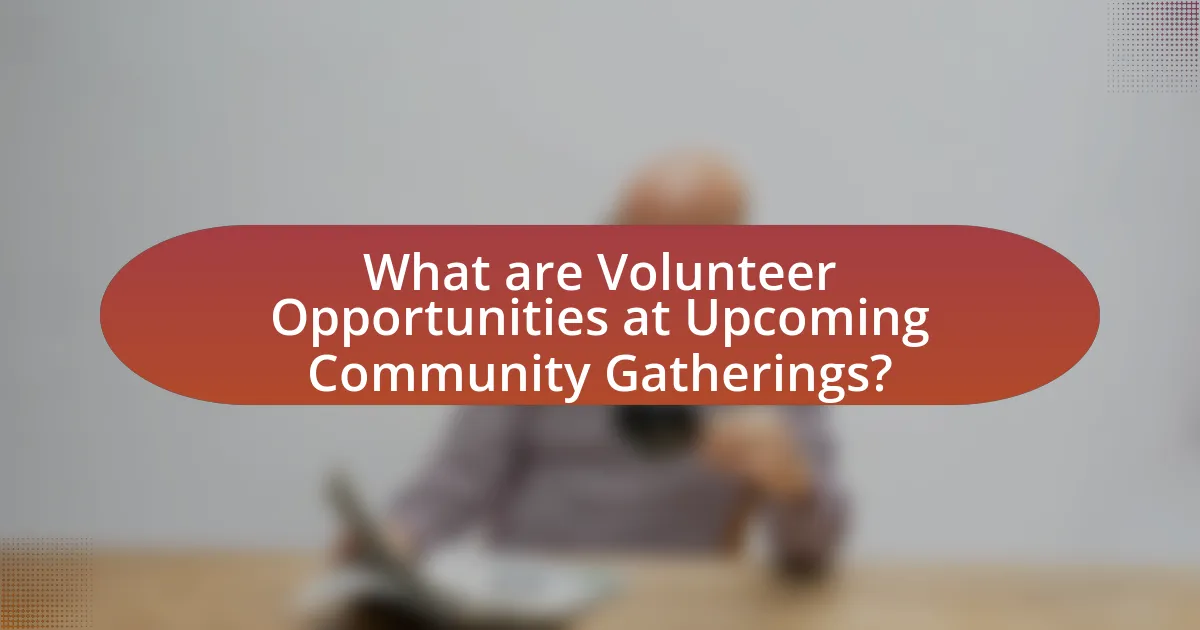
What are Volunteer Opportunities at Upcoming Community Gatherings?
Volunteer opportunities at upcoming community gatherings include roles such as event setup and breakdown, registration assistance, and activity coordination. These positions allow volunteers to engage directly with attendees, support event logistics, and enhance the overall experience. For instance, local community centers often seek volunteers to help manage food distribution or facilitate workshops, which fosters community involvement and strengthens social ties.
How can individuals get involved in these volunteer opportunities?
Individuals can get involved in volunteer opportunities at upcoming community gatherings by registering through local community centers or event websites. Many organizations post volunteer needs online, allowing individuals to sign up for specific roles or shifts. For example, platforms like VolunteerMatch and local nonprofit websites often list opportunities, making it easy for individuals to find and apply for roles that match their interests and availability. Additionally, attending community meetings or outreach events can provide direct information on how to volunteer, as organizers often seek local support for their initiatives.
What types of roles are available for volunteers at community gatherings?
Volunteers at community gatherings can take on various roles, including event setup and teardown, registration assistance, crowd management, and activity facilitation. These roles are essential for ensuring the smooth operation of events, as they help manage logistics, assist attendees, and create a welcoming environment. For instance, volunteers involved in registration help check in participants, while those in crowd management ensure safety and order during the gathering.
What skills or qualifications are needed to volunteer?
To volunteer, individuals typically need skills such as communication, teamwork, and problem-solving. These skills enable effective interaction with diverse groups and facilitate collaboration in various tasks. Additionally, specific qualifications may include a background in the relevant field, such as education, healthcare, or event planning, depending on the volunteer role. For instance, volunteering in a healthcare setting often requires basic first aid knowledge or certifications. Research indicates that volunteers with these skills and qualifications are more likely to contribute positively to community initiatives, enhancing overall effectiveness and engagement in volunteer activities.
Why is volunteering at community gatherings important?
Volunteering at community gatherings is important because it fosters social cohesion and strengthens community ties. Engaging in volunteer work allows individuals to connect with their neighbors, share resources, and collaborate on common goals, which enhances the overall sense of belonging. Research indicates that communities with active volunteer participation experience lower crime rates and improved public health outcomes, as seen in studies conducted by the Corporation for National and Community Service. These findings highlight the tangible benefits of volunteering, demonstrating its role in creating a supportive and resilient community environment.
How does volunteering benefit the community?
Volunteering benefits the community by fostering social cohesion and addressing local needs. When individuals volunteer, they contribute their time and skills to support various initiatives, such as food drives, educational programs, and environmental clean-ups. This collective effort not only enhances community resources but also strengthens relationships among residents, leading to a more connected and resilient society. Research from the Corporation for National and Community Service indicates that communities with higher volunteer rates experience lower crime rates and improved public health outcomes, demonstrating the tangible impact of volunteerism on community well-being.
What personal benefits can volunteers gain from participating?
Volunteers can gain several personal benefits from participating, including enhanced skills, social connections, and improved mental well-being. Engaging in volunteer work allows individuals to develop new competencies, such as leadership, teamwork, and communication skills, which are valuable in both personal and professional contexts. Additionally, volunteering fosters social connections by providing opportunities to meet diverse groups of people, thereby expanding one’s network and sense of community. Research indicates that volunteering can also lead to improved mental health, as it often results in increased feelings of happiness and fulfillment, with studies showing that volunteers report lower levels of depression and higher life satisfaction.
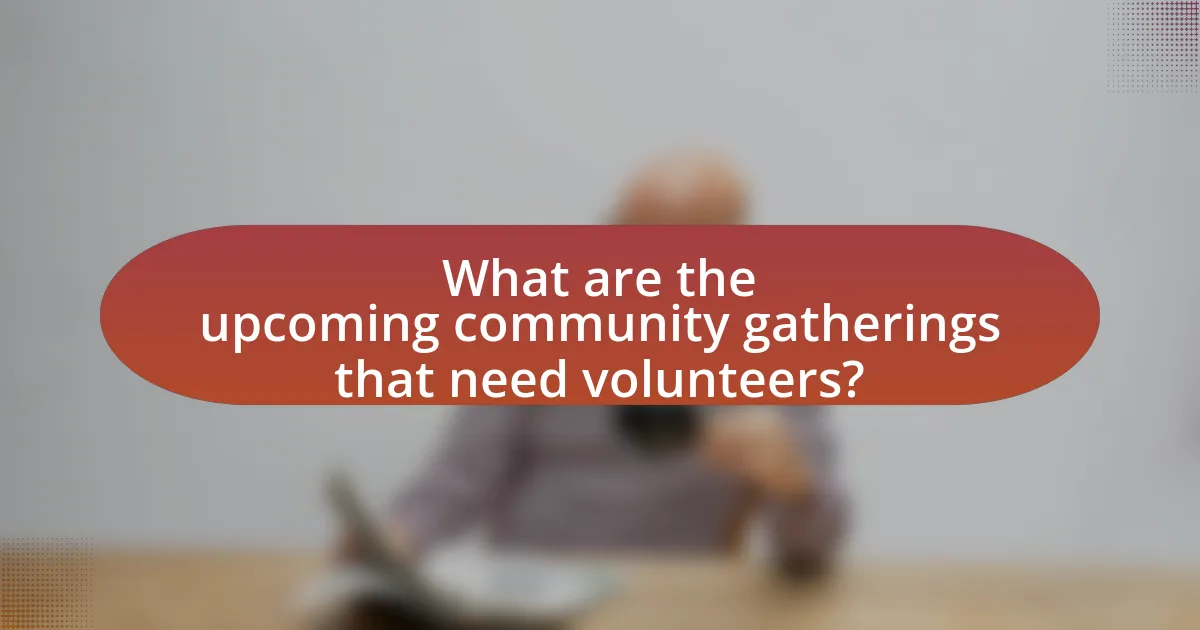
What are the upcoming community gatherings that need volunteers?
Currently, specific upcoming community gatherings that need volunteers include the annual neighborhood clean-up scheduled for next month, the local food bank’s holiday drive, and the community arts festival planned for the summer. These events typically require volunteers for various tasks such as organizing, setting up, and assisting participants. For instance, the neighborhood clean-up aims to engage residents in beautifying their area, while the food bank drive focuses on collecting and distributing food to those in need.
How can volunteers find information about these gatherings?
Volunteers can find information about these gatherings through community bulletin boards, local nonprofit organizations, and social media platforms. Community bulletin boards often display flyers and announcements regarding upcoming events, while local nonprofit organizations frequently host or promote gatherings and can provide details directly. Additionally, social media platforms, such as Facebook and Twitter, often feature event pages and groups dedicated to community activities, making it easy for volunteers to stay informed about opportunities to participate.
What resources are available for locating volunteer opportunities?
Online platforms such as VolunteerMatch, Idealist, and local community service websites are essential resources for locating volunteer opportunities. These platforms aggregate listings from various organizations seeking volunteers, allowing individuals to search by location, interests, and availability. For instance, VolunteerMatch connects over 1.5 million volunteers with opportunities across the United States, demonstrating its extensive reach and effectiveness in matching volunteers with suitable roles. Additionally, local nonprofits often post volunteer needs on their websites or social media pages, providing direct access to community-specific opportunities.
How can social media be used to discover community events?
Social media can be used to discover community events by providing platforms where organizations and individuals share information about local gatherings. Users can follow community pages, join groups, and utilize event features on platforms like Facebook, Instagram, and Twitter to stay updated on upcoming events. For instance, Facebook’s event feature allows users to RSVP and receive notifications about events in their area, which enhances community engagement. Additionally, hashtags on platforms like Instagram and Twitter can help users find events by searching for specific tags related to their interests or location, making it easier to connect with volunteer opportunities at these gatherings.
What are the dates and locations of these gatherings?
The dates and locations of the upcoming community gatherings are as follows: The first gathering is scheduled for March 15, 2024, at Central Park, New York City. The second gathering will take place on April 20, 2024, at Riverside Park, Los Angeles. These events are organized to promote volunteer opportunities and community engagement.
How can volunteers prepare for specific events?
Volunteers can prepare for specific events by understanding their roles, familiarizing themselves with the event schedule, and attending any pre-event training sessions. Knowing their responsibilities ensures that volunteers can effectively contribute to the event’s success. Familiarity with the schedule allows them to anticipate peak times and manage their tasks efficiently. Pre-event training sessions often provide essential information about safety protocols, event logistics, and communication procedures, which are critical for smooth operations.
What logistical considerations should volunteers keep in mind?
Volunteers should keep in mind transportation, scheduling, resource allocation, and communication as key logistical considerations. Transportation involves ensuring reliable access to the event location, which may include arranging carpooling or public transit options. Scheduling requires volunteers to be aware of their assigned shifts and the overall timeline of the event to ensure smooth operations. Resource allocation includes understanding the materials and supplies needed for their tasks, ensuring they are prepared and available. Effective communication is crucial for coordinating with team members and organizers, which can be facilitated through group messaging apps or regular check-ins. These considerations help ensure that volunteers can contribute effectively and enhance the overall success of community gatherings.
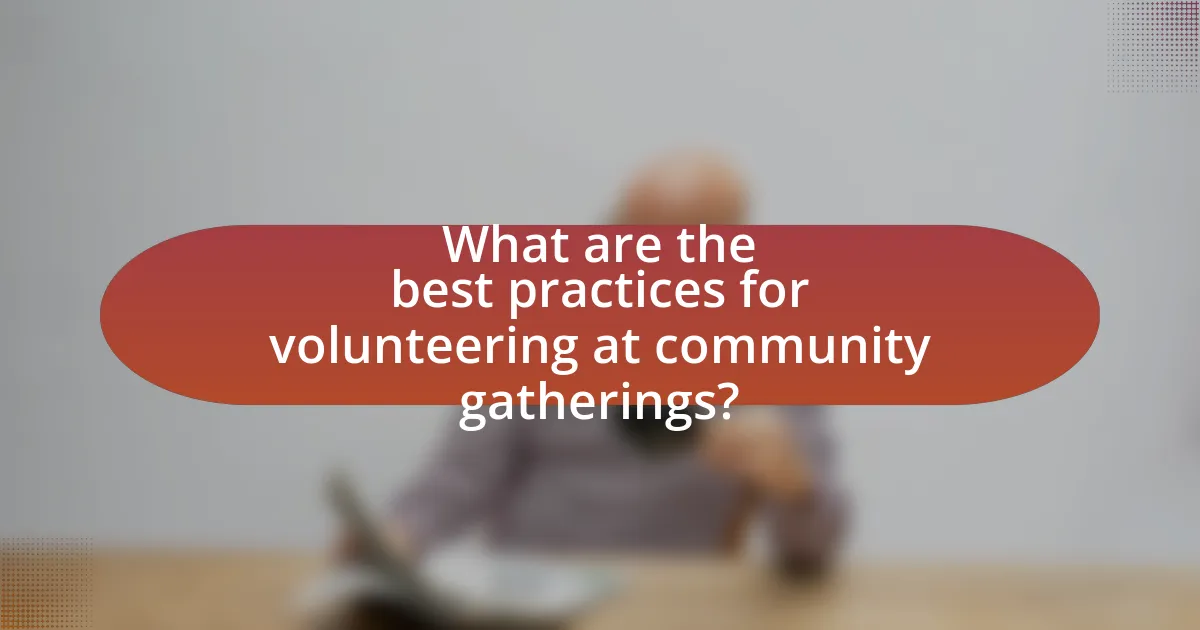
What are the best practices for volunteering at community gatherings?
The best practices for volunteering at community gatherings include clear communication, understanding roles, and being proactive. Clear communication ensures that volunteers and organizers are aligned on expectations and tasks, which enhances efficiency. Understanding roles allows volunteers to perform their duties effectively, as each person knows their specific responsibilities. Being proactive involves anticipating needs and addressing them before they become issues, which contributes to a smoother event. These practices are supported by research indicating that effective volunteer management leads to higher satisfaction and better outcomes for community events.
How can volunteers effectively communicate with event organizers?
Volunteers can effectively communicate with event organizers by establishing clear channels of communication, such as designated email addresses or messaging platforms. This ensures that both parties can exchange information efficiently and address any questions or concerns promptly. Regular updates and check-ins from volunteers can also enhance communication, allowing organizers to provide necessary guidance and support. Research indicates that effective communication in volunteer settings leads to higher satisfaction and better event outcomes, as seen in studies conducted by the Corporation for National and Community Service, which highlight the importance of structured communication in volunteer management.
What questions should volunteers ask before the event?
Volunteers should ask about the event’s schedule, their specific roles, and any necessary training or orientation. Understanding the event’s timeline ensures volunteers know when to arrive and what to expect. Clarifying roles helps volunteers understand their responsibilities, which can include tasks like registration, setup, or assisting attendees. Inquiring about training or orientation ensures that volunteers are adequately prepared and informed about the event’s procedures and expectations. These questions are essential for effective participation and contribute to the overall success of the event.
How can volunteers ensure they are fulfilling their roles effectively?
Volunteers can ensure they are fulfilling their roles effectively by clearly understanding their responsibilities and actively communicating with their coordinators. This involves reviewing the role descriptions provided by the organization, asking questions for clarification, and participating in any training sessions offered. Research indicates that effective communication and role clarity significantly enhance volunteer performance, as highlighted in a study by the Corporation for National and Community Service, which found that well-informed volunteers are 50% more likely to report satisfaction in their roles. By maintaining open lines of communication and seeking feedback, volunteers can adapt to the needs of the event and contribute meaningfully to the community gathering.
What tips can enhance the volunteer experience?
To enhance the volunteer experience, individuals should engage in clear communication and set realistic expectations. Effective communication ensures that volunteers understand their roles and responsibilities, which can lead to increased satisfaction and productivity. Setting realistic expectations helps volunteers feel valued and reduces the likelihood of burnout. Research indicates that organizations with structured onboarding processes report higher volunteer retention rates, as volunteers are more likely to feel prepared and supported in their roles.
How can volunteers network with other community members during events?
Volunteers can network with other community members during events by actively engaging in conversations, participating in group activities, and attending networking sessions. Engaging in conversations allows volunteers to introduce themselves and share their interests, fostering connections. Participating in group activities, such as team-building exercises or collaborative projects, encourages teamwork and interaction, which can lead to meaningful relationships. Additionally, attending designated networking sessions provides structured opportunities for volunteers to meet community members and exchange contact information, enhancing their network. These strategies are effective as they create environments conducive to relationship-building, supported by the fact that social interactions are a key component of community engagement.
What strategies can help volunteers manage their time effectively during gatherings?
Volunteers can manage their time effectively during gatherings by prioritizing tasks, creating a schedule, and utilizing checklists. Prioritizing tasks allows volunteers to focus on the most critical activities first, ensuring that essential responsibilities are completed. Creating a schedule helps volunteers allocate specific time slots for each task, which can enhance productivity and reduce stress. Utilizing checklists ensures that no tasks are overlooked and provides a clear visual of progress. Research indicates that structured time management techniques can improve efficiency and reduce the likelihood of burnout among volunteers, as evidenced by studies showing that organized volunteers report higher satisfaction and effectiveness in their roles.
What are common challenges volunteers face and how can they be overcome?
Common challenges volunteers face include time constraints, lack of training, and insufficient support. Time constraints can be addressed by offering flexible scheduling options that accommodate volunteers’ availability. Lack of training can be mitigated through structured onboarding programs that provide essential skills and knowledge. Insufficient support can be overcome by establishing clear communication channels and assigning mentors to guide volunteers throughout their experience. These strategies enhance volunteer engagement and effectiveness, ultimately benefiting community gatherings.
How can volunteers handle unexpected situations during events?
Volunteers can handle unexpected situations during events by remaining calm, assessing the situation, and communicating effectively with team members and attendees. When faced with an unforeseen issue, such as a medical emergency or equipment failure, volunteers should first evaluate the severity of the situation to determine the appropriate response. For instance, if someone is injured, they should call for medical assistance immediately while ensuring the safety of others. Effective communication is crucial; volunteers should relay information clearly to their team and follow established protocols to manage the situation efficiently. Research indicates that well-prepared volunteers who receive training in crisis management are more effective in handling unexpected events, as they can respond quickly and confidently, minimizing disruption and ensuring safety.
What resources are available for volunteers needing support?
Volunteers needing support can access various resources, including training programs, mentorship opportunities, and online forums. Training programs often provide essential skills and knowledge relevant to specific volunteer roles, while mentorship opportunities connect inexperienced volunteers with seasoned individuals for guidance. Online forums serve as platforms for volunteers to share experiences, seek advice, and find community support. These resources are crucial for enhancing volunteer effectiveness and ensuring a positive experience in community gatherings.
